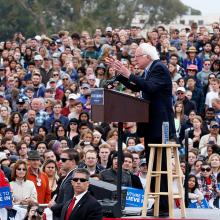social gospel
THE BLACK SOCIAL gospel is a critically important religious tradition—one that Gary Dorrien gives exquisite treatment in Breaking White Supremacy: Martin Luther King Jr. and the Black Social Gospel. This is the second installment of a two-volume series. The first, The New Abolition: W.E.B. Du Bois and the Black Social Gospel, won the prestigious Grawemeyer Award in Religion. The black social gospel, Dorrien explains, focuses not only on a political economy of justice—on matters including labor, land, and democratic use and ownership of capital—but also, unlike white social gospels, on racial equity.
Breaking White Supremacy explains the family tree of transformative religion that birthed Martin Luther King Jr.’s unique, but not unprecedented, practice of Christianity in Jim Crow America. Dorrien contends that mystic and author Howard Thurman, Morehouse College president Benjamin Mays, and Howard University president Mordecai Johnson provided examples of black Christian piety for King, which along with liberal theological education at seminaries in the northern region of the country shaped King to push America to become the social democracy it has never been.

Image via REUTERS / Lucy Nicholson / RNS
As Bernie Sanders’ insurgent campaign for the Democratic presidential nomination heated up in these past months, so too did comparisons between the fervor fueling Sanders’ political movement and the faith-based mobilization of an old-time religious revival.
“More than any other candidate Bernie draws on the language of right and wrong to make his pitch. Politics for Bernie isn’t a job, it’s a crusade,” Grant Diamond, pastor of Faith Baptist Mill Creek, west of Chicago, wrote on his blog last month.
WHEN MOST PEOPLE remember George McGovern, the longtime South Dakota senator who passed away in 2012, they probably don’t think first of his evangelical Christian background or see him as a model for evangelicals today.
But McGovern, the Democratic nominee who ran against President Richard Nixon in 1972, actually serves as a worthy exemplar of evangelically rooted social action.
The source of McGovern’s progressive and moral political views may be surprising to some. He was a son of the evangelical church. His father, Rev. Joseph McGovern, was an ordained minister of the Wesleyan Methodist Church (now the Wesleyan Church). It was founded in 1843 as a protest movement against the larger Methodist Episcopal Church. Simply put, they thought slavery sinful and left the denomination to make clear their moral opposition to the “peculiar institution.”
George McGovern enjoyed a good relationship with his father. His childhood was shaped by the rhythms of church life—three or four services on Sunday, prayer meeting on Wednesday night, and daily prayer and Bible readings. The annual family vacation was a two-week campout at nearby Mitchell Holiness Campground. Revival services were conducted nightly.
High-octane contemporary worship with smoke, flashing lights, and words on huge screens energize and empower 3,400 Pentecostals from 69 countries filling the Calvary Convention Centre in Kuala Lumpur, Malaysia,. This is the 23rd Pentecostal World Conference, a triennial gathering of pastors, leaders, and youth from around the globe. I’m here as part of a delegation from the Global Christian Forum, warmly invited, seated right in the front, and including representatives from the Lutheran, Orthodox, Seventh-Day Adventist, Mennonite, African-Instituted and Reformed church bodies, all members of the GCF steering committee. We’re easy to pick out of the crowd, since we’re the only ones who don’t spontaneously raise our hands in worship. I hope that image doesn’t make it to the big screens.
The explosive growth of Pentecostalism is an astonishing chapter in the story of world Christianity’s modern history. In 1970, Pentecostals (including charismatics in non-Pentecostal denominations) totaled about 62 million, or 5 percent of the total Christian population. In the four decades since, Pentecostals have grown at 4 times the rate of overall Christianity, and 4 times faster than the world’s population growth. Today they number about 600 million — one out of every four Christians in the world, and one out of every 12 people alive today. Most of this growth has come in the global South, in places like Africa, South America, and — yes — Malaysia.
The Pentecostal World Conference doesn’t look much like a typical denominational or ecumenical assembly. It’s more like a global revival service. Several of the world’s best-known Pentecostal preachers and leaders deliver stirring messages, complete with altar calls for those seeking the fresh empowerment of God’s Spirit in their lives and ministries. It’s a far cry from a Reformed Church in America General Synod, which I facilitated for many years. But these keynote speakers, along with the workshops held each day of the conference, open a window into global Pentecostalism’s present trends, challenges, and directions.
In writing From Times Square to Timbuktu: The Post-Christian West Meets the Non-Western Church, I found that one of the most intriguing questions I encountered is how rapidly growing forms of Christianity in the global South deal with social and economic issues within their societies. So in Kuala Lumpur, I was especially attentive to what might be said by the world’s Pentecostal leadership about the biblical call to justice and mercy. And I heard a lot that I wish I could now go back and add to my book.
You might not be a fan of Justin Bieber, but I'm willing to bet there's at least one young person in your life who is.
And while it may be hard for us adults to believe, young Bieber, the Canadian pop superstar, has brought the Gospel -- of social justice and otherwise -- to millions of fans (who call themselves "Beliebers") around the globe.
Today -- just in time for Mother's Day -- Bieber, 18, released the new single "Turn to You" from his forthcoming album BELIEVE. It's a love song -- a tribute to his mother, Pattie Mallette, who gave birth to her only child when she was just 17 years old. Both Bieber and Mallette are devoted Christians (evangelicals, in fact) and neither is shy about speaking about their faith publicly.
“God is the one that is orchestrating all of this and giving [Justin] such incredible favor,” Mallette said in an interview with the Hollywood Prayer Network last year. “And he knows that it’s for a purpose and a plan. And he’s not sure what all that entails yet and how he fits into that, but he knows that it’s by God’s hand.”
 Listen to the new song inside the blog ...
Listen to the new song inside the blog ...
A conference at Cedarville University shows new political boundary-crossing in the Christian college world.
Social Muddle: Business, Justice, and the Gospel are Already Social; Obama Refers to His Christian Faith During National Tree Lighting Ceremony; Fount of Blessing, Fount of Youth: Age and the American Church; One-Third of Shelter Residents Are Newly Homeless; U.S. Unemployment Rate Falls to Lowest Level in Nearly Three Years; Gingrich Says Poor Children Have No Work Habits; For Afghan Woman, Justice Runs Into Unforgiving Wall of Custom.
Over the weekend, our friend Paul Brandeis Raushenbush, senior religion editor for the Huffington Post, was a guest on NPR's "On Being" program with host Krista Tippett, to talk about how the Social Gospel movement of the early 20th century is shaping the religious and spiritual reality of 2011.
An ordained American Baptist minister and a former dean of religious life and the chapel at Princeton University, Raushenbush is the great-grandson of both the venerable Christian scholar Walter Rauschenbush and U.S. Supreme Court Justice Louis Brandeis. He talked to Tippett about the influence of faith on the Occupy movement, religion and emerging technologies and what his great-grandfather Rauschenbush's take on the social gospel — he famously said, "Social problems are moral problems on a larger scale" — has to say to the life of the church and society writ large today.
It's a compelling conversation, well worth your taking the time to listen.
Ever since Peter and Paul had opposing views about ministry to the Gentiles, there have been divisions in the Christian church. But rarely in the course of church history have differences among Christians been so exploited and manipulated for political gain by those outside the church as is the case today.




